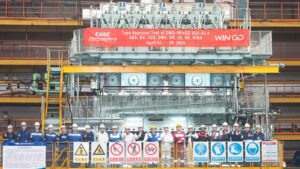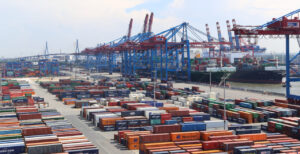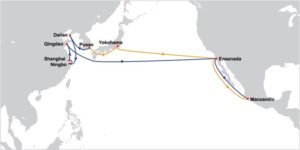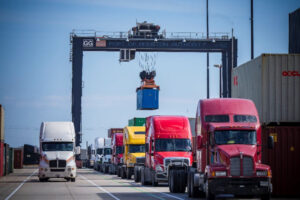US West Coast port union workers have refused to operate on containerships that were diverted from the striking ports in Canada’s West Coast.
International Longshore and Warehouse Union (ILWU) US West Coast President, Willie Adams, told CNBC in a statement: “The ILWU will not be unloading Canadian bound cargo in solidarity with our Brothers and Sisters in ILWU Canada.”
With 16 vessels currently anchored off the Port of Vancouver and another six vessels at Prince Rupert, CNBC has reported that another 15 containerships are bound for Vancouver and nine for Prince Rupert, ships of which the ILWU would avoid, should they be rerouted.
Two of the vessels to be diverted were the MSC Sara Elena and the OOCL San Francisco, while the MSC Matilde V recently departed back to Qingdao after holding cargo intended for Vancouver, reported CNBC.
READ: Looming ILWU Canada’s strikes threaten supply chain once more
The diversions mark the beginning of a potential widespread rerouting of ships, threatening delays in planned arrivals and additional pressure on supply chains.
This has occurred precisely at the start of the peak season when holiday and back-to-school goods are in high demand.
Head of Ocean Freight Americas for DHL Global Forwarding, Goetz Alebrand, reported to CNBC: “This is the largest disruption we have seen since the pandemic and comes at a time when the supply chain was stabilising.”
The ILWU’s stance is consistent with their continued support of the labour strike at the Canadian West Coast ports, which was also supported by the International Longshoremen’s Association (ILA).
In fact, the ILA had previously declared that containerships that have rerouted from striking ports will not be accepted.
READ: MSC’s Far East-Pacific Northwest route shift postponed due to Canada’s strikes
The strikes follow a collapse in labour negotiations between the British Columbia Maritime Employers Association (BCMEA) and the ILWU Canada earlier in the month, with each party blaming the other of being responsible for the breakdown.
The ongoing strike has the potential to cause congestion at Canadian ports as longshoremen are unable to unload incoming vessels.
Such congestion, which may take from weeks to months to clear according to the Canadian National Railway Company, can also quickly escalate into backlogs, resulting in delays in picking up goods from terminals.
These delays often result in additional charges, which are typically passed on to consumers, reminiscent of the situation experienced during the pandemic.
The BC port strike has now entered its 10th day. It is crucial that both parties and the federal government do what is necessary to avoid further disruption to Canada’s supply chains. pic.twitter.com/qx9q3rvxln
— Canadian National (@CNRailway) July 10, 2023
READ: New bill seeks to limit union power in light of US West Coast strikes
According to Paul Brashier, Vice President of Drayage and Intermodal at ITS Logistics, clients are actively seeking alternative American ports.
“Right now, we are advising all clients with freight that was booked to Vancouver or Prince Rupert to work with their booking agents to track the US ports of call of the vessels that their containers are on and see if the ocean liners will allow reconsignment to a US port,” Brashier told CNBC.
As Canadian ports typically handle a wide range of goods destined for the US, trade organisations such as the American Apparel and Footwear Association and the National Retail Federation have urged the Canadian government to facilitate efforts to keep all parties engaged in negotiations.
READ: Canada West Coast port labourers call to strike in unanimous vote









